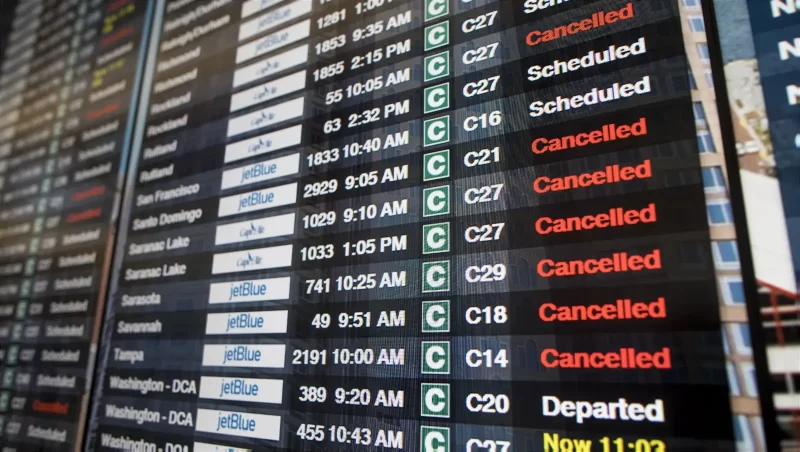Breaking News
JUST IN: US cancels, delays 1,700 flights over severe storms
Kirby stated he will be meeting with the FAA and Department of Transportation “to discuss what steps FAA can take in the immediate term to prevent this from happening again this summer.” The FAA responded this morning, saying “We will always collaborate with anyone seriously willing to join us to solve a problem.”

Disruptions for air travellers continued Tuesday with more than 1,700 flights across the United States delayed or cancelled after powerful storms ripped through the parts of the country, including in the Mid-Atlantic and parts of the Northeast where many busy hubs are located.
Data from FlightAware showed that on Tuesday morning, 910 flights within, into or out of the US were delayed and another 808 were cancelled, according to CNN.
Still, it was a major decrease from Monday’s chaos when more than 8,000 flights were either delayed or cancelled because of severe weather and air traffic control staffing issues.
United Airlines was once again faring the worst of the American domestic airlines. About 12% of its schedule, or 338 flights, was cancelled and another 3%, or 92 flights, was delayed as of 7 am ET.
Republic Airways, which operates short-haul flights for American Airlines, Delta and United, had 17% of its schedule cancelled (153 flights) but few delays.
The four US airports most affected Tuesday morning are all major hubs for either United or Delta: New Jersey’s Newark Liberty, both of New York City’s airports (LaGuardia and John F. Kennedy) and Boston’s Logan.
Also, CNN said more than 40 million people in the Northeast and Central Plains are at risk of severe storms on Tuesday.
The majority of people at risk are located in the Northeast, including Philadelphia and Washington, DC, where a Level 1 of 5 threat has been issued by the Storm Prediction Center.
A level 3 of 5 threat of severe weather is highlighted for parts of Kansas and Oklahoma, including Wichita and Tulsa.
Scattered thunderstorms are again expected east of a cold front from the Mid-Atlantic into parts of the Northeast, leading to the possibility of even more flight delays and cancellations later.
Some of these afternoon storms could produce damaging wind gusts, and heavy rain from these storms could produce isolated instances of flash flooding, particularly over parts of southeastern New York, Delaware and Pennsylvania.
Tuesday’s travel troubles are the fourth day in the row of delays and cancellations. They began on Saturday when air traffic controller staffing problems disrupted numerous flights, leading to “unprecedented challenges” for United.
“The [Federal Aviation Administration] frankly failed us this weekend,” said United CEO Scott Kirby in an internal company memo shared with CNN. The airline cancelled 461 flights this past Saturday and Sunday and delayed another 1,972 flights, according to data from flight tracking site FlightAware.
Kirby said that on Saturday, the FAA reduced arrival rates at its major hub at Newark Liberty International Airport by 40% and departure rates by 75%, which was “almost certainly a reflection of understaffing and lower experience at the FAA.”
“It led to massive delays, cancellations, diversions, as well as crews and aircraft out of position,” Kirby said. “And that put everyone behind the eight ball when the weather actually did hit on Sunday and was further compounded by FAA staffing shortages Sunday evening.”
Kirby stated he will be meeting with the FAA and Department of Transportation “to discuss what steps FAA can take in the immediate term to prevent this from happening again this summer.” The FAA responded this morning, saying “We will always collaborate with anyone seriously willing to join us to solve a problem.”
The pressure from one of the largest commercial airlines in the world comes as millions of passengers are expected to pack flights for the July 4 holiday weekend, which United says will be its busiest July 4 travel period since the coronavirus pandemic struck.
In the memo, Kirby was careful to say the current FAA leadership did not create the current staffing problem, but that they need to deal with them. “To be fair, it’s not the fault of the current FAA leadership,” he wrote, but added, “They are responsible for solving the problem they inherited.”




















